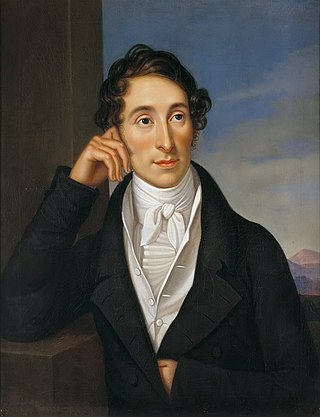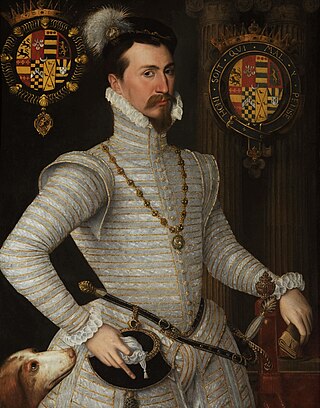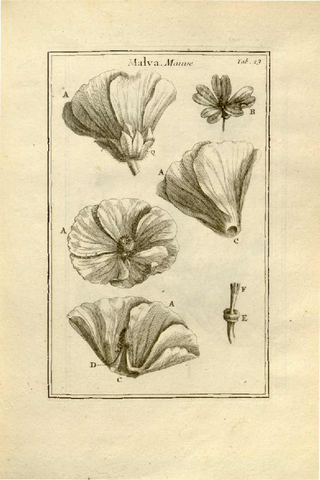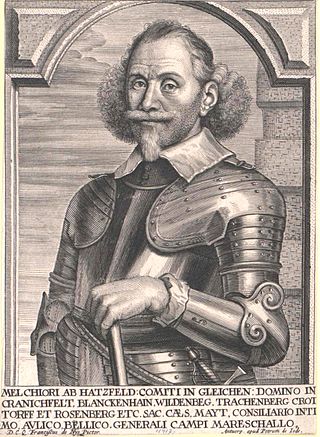
Theodor Dorsten (Latin:Theodoricus Dorstenius) (Dorsten, 1492-Kassel, 18 May 1552) was a German botanist and physician. [1] The genus Dorstenia was named in his honor, [2] a name later used by used by Carl Linnaeus [3] and others.

Theodor Dorsten (Latin:Theodoricus Dorstenius) (Dorsten, 1492-Kassel, 18 May 1552) was a German botanist and physician. [1] The genus Dorstenia was named in his honor, [2] a name later used by used by Carl Linnaeus [3] and others.
He studied in University of Erfurt and later became a professor at University of Marburg. He wrote Botanicon in 1540. [4] Dorsten did not use his family name Gluntius in his publications.

Carl Linnaeus, also known after ennoblement in 1761 as Carl von Linné, was a Swedish biologist and physician who formalised binomial nomenclature, the modern system of naming organisms. He is known as the "father of modern taxonomy". Many of his writings were in Latin; his name is rendered in Latin as Carolus Linnæus and, after his 1761 ennoblement, as Carolus a Linné.

Carl Edward Sagan was an American astronomer, planetary scientist, and science communicator. His best known scientific contribution is his research on the possibility of extraterrestrial life, including experimental demonstration of the production of amino acids from basic chemicals by exposure to light. He assembled the first physical messages sent into space, the Pioneer plaque and the Voyager Golden Record, which were universal messages that could potentially be understood by any extraterrestrial intelligence that might find them. He argued in favor of the hypothesis, which has since been accepted, that the high surface temperatures of Venus are the result of the greenhouse effect.

Carl Gustav Jung was a Swiss psychiatrist, psychotherapist and psychologist who founded the school of analytical psychology. He was a prolific author, illustrator, and correspondent, and a complex and controversial character, perhaps best known through his "autobiography" Memories, Dreams, Reflections.

Carl Maria Friedrich Ernst von Weber was a German composer, conductor, virtuoso pianist, guitarist, and critic of the early Romantic period. Best known for his operas, he was a crucial figure in the development of German Romantische Oper.

Robert Dudley, 1st Earl of Leicester, was an English statesman and the favourite of Elizabeth I from her accession until his death. He was a suitor for the queen's hand for many years.

John Rogers was an English clergyman, Bible translator and commentator. He guided the development of the Matthew Bible in vernacular English during the reign of Henry VIII and was the first English Protestant executed as a heretic under Mary I, who was determined to restore Roman Catholicism.

In Greek mythology, Epimetheus is the twin brother of Prometheus, the pair serving "as representatives of mankind". Both sons of the Titan Iapetus, while Prometheus ("foresight") is ingeniously clever, Epimetheus ("hindsight") is inept and foolish. In some accounts of the myth, Epimetheus unleashes the unforeseen troubles in Pandora's box.

Sébastien Vaillant was French botanist who was born at Vigny in present-day Val d'Oise.

The Siege of Leiden occurred during the Eighty Years' War and the Anglo–Spanish War in 1573 and 1574, when the Spanish under Francisco de Valdez attempted to capture the rebellious city of Leiden, South Holland, the Netherlands. The siege failed when the city was successfully relieved in October 1574.

Marl is a town and a municipality in the district of Recklinghausen, in North Rhine-Westphalia, Germany. It is situated near the Wesel-Datteln Canal, approx. 10 km north-west of Recklinghausen. It has about 90,000 people.

Carl Daniel Friedrich Meissner was a Swiss botanist.

Claude Aubriet was a French illustrator and botanical artist. The standard author abbreviation Aubriet is used to indicate this person as the author when citing a botanical name.
Fritz Tornow was a Feldwebel in the German Army who served as Adolf Hitler's personal dog-handler. He was one of the last people to occupy the Führerbunker when the underground complex was captured by Soviet Red Army troops.
Günter Pröpper is a German retired professional footballer who played as a forward. Born in Dorsten, Pröpper started his career in amateur football before joining VfL Osnabrück in 1964. He spent three seasons with the club, moving on to Rot-Weiss Essen in 1967. Two years later he joined Wuppertaler SV, where he played for the remainder of his career.

In the siege of Dorsten, an Imperial force under Melchior von Hatzfeldt besieged the Hessian garrison in the town of Dorsten from 16 July 1641 to 19 September 1641 during the Thirty Years' War. The garrison capitulated on 18 September 1641 and moved out of the town the following day.

Dorsten station is the central station in the town of Dorsten in the German state of North Rhine-Westphalia. It is located east of the town centre and the line is orientated north-south.
Daniel Rogers (1538?–1591) was an Anglo-Flemish diplomat and politician, known as a well-connected humanist poet and historian.

On direct instructions from Adolf Hitler, Nazi German forces deported and interned 2,300 Channel Islands civilian residents. The stated reason was retaliation for internment of German citizens in Persia by the British Government.

Melchior Graf von Gleichen und Hatzfeldt was an Imperial Field Marshal. He fought in the Thirty Years' War first under Albrecht von Wallenstein and Matthias Gallas, then received an independent command in Westphalia. Usually successful with a smaller corps on this secondary front and victorious at Vlotho and Dorsten, he lost at Wittstock and Jankau in his brief intermezzos as commander of major armies.
Agnes Hürland-Büning was a German politician with strong local roots. She was a member of the Bundestag for nearly twenty years between 1972 and 1991. She chaired the local Recklinghausen CDU party between 1977 and 1983, and served between 1979 and 1983 as deputy party chair for the CDU regional party executive in Westfalen-Lippe. Between 1987 and 1991 she was a parliamentary secretary of state in the West German Defence Ministry.